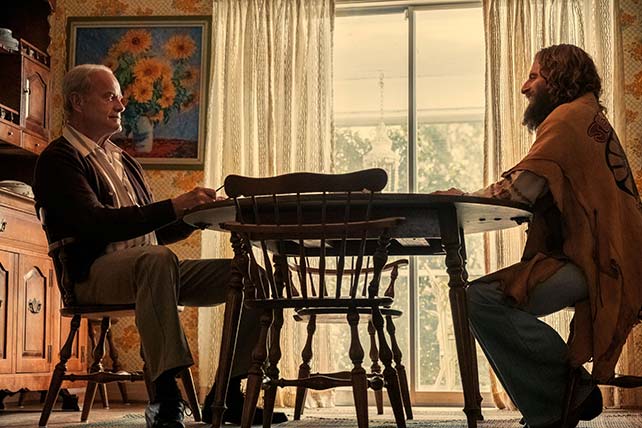In their interview, Valadez asked McCorkle if there was a reason the directors left out the details regarding Frisbee’s sexuality.
“There was a lot of talk about it. During this era that we shot, we felt very, very compelled and almost convicted to just be with Lonnie, where he was at, and not try to bring in you know, other things,” McCorkle explained.
Admitting that they knew their decision would be controversial, the director told Valadez, “But that was just our thing. It’s like, okay, who was Lonnie in 1969, in 1971? We’re gonna stay there. So he was married to Connie. They had a turbulent relationship, and we played it with the Lonnie that we know historically was happening in ’69 and ’70.”
RELATED: Kelsey Grammer Tears Up Promoting ‘Jesus Revolution’ on ‘Live With Kelly and Ryan’
McCorkle didn’t dispute that Frisbee changed throughout the years and said they showed some things that weren’t great in his life, particularly towards the end of the film.
“So yeah, that was a conscious choice for sure,” McCorkle said in reference to leaving out Frisbee’s sexuality. “He had a lot of struggles. He came from a really broken background. He did a lot of drugs. He did a lot of LSD.”
McCorkle described Frisbee as a “very mercurial artist” who had a lot of things stacked against him, but was “a beautiful soul” with a big ego who “wouldn’t listen to people, and yet he was one of the most gifted seers and Christian ministers of our time.”
RELATED: Greg Laurie’s ‘Jesus Revolution’ Releases Amid Renewed Interest in Revival
Some Christians have gone to great lengths to erase Frisbee from their history due to his background, McCorkle added. Some have “eradicate him to the point that they’ve gone into their literature and reprinted it without his name on it.”
“So we tried to bring forth the most accurate, honest, Lonnie that had massive giftings that were undeniable and put him out there in the world and reinstate him back into the story in the way that we felt was honoring to him, and also told the true story of what was going on in his life and 69 and 70,” McCorkle concluded.

